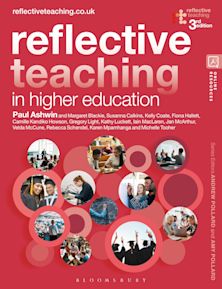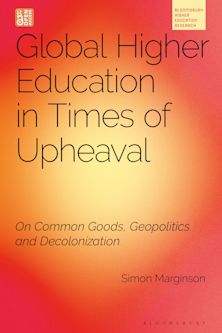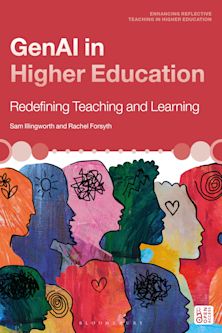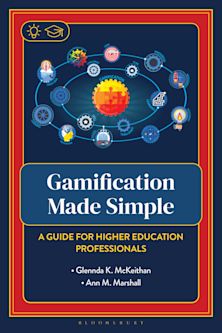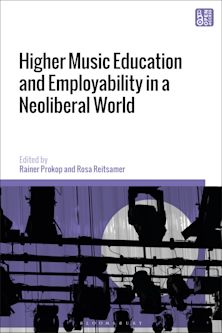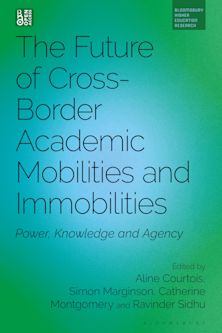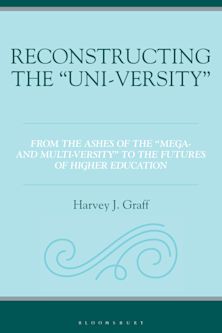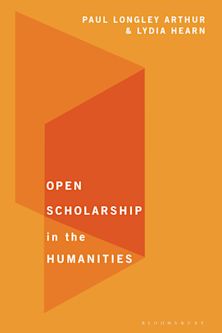- Home
- ACADEMIC
- Education
- Higher Education
- How Powerful Knowledge Disrupts Inequality
How Powerful Knowledge Disrupts Inequality
Reconceptualising Quality in Undergraduate Education
How Powerful Knowledge Disrupts Inequality
Reconceptualising Quality in Undergraduate Education
This product is usually dispatched within 3 days
- Delivery and returns info
-
Free US delivery on orders $35 or over
You must sign in to add this item to your wishlist. Please sign in or create an account
Description
Please note, the book was previously published in hardback with the title Quality in Undergraduate Education (ISBN 9781474214490).
Globally, the appetite for higher education is great, but what do students and societies gain? This book foregrounds the importance of knowledge acquisition at university. Many argue that university education is no longer a public good due to the costs incurred by students who are then motivated by the promise of lucrative employment rather than by studying a discipline for its own sake. McLean, Abbas and Ashwin, however, reveal a more complex picture and offer a way of thinking about good quality university education for all. Drawing on a study which focused on four sociology-related social science UK university departments of different reputation, the book shows that students value sociological knowledge because it gives them a framework to think about and act on understanding how individuals and society interact. Further, the authors discuss how what was learned from the study about how policy, curriculum and pedagogy might preserve and strengthen the personal and social gains of social science undergraduate education.
Table of Contents
1. University Education, Inequality and Knowledge
2. Introducing the Four Universities and Departments
Part II: Setting the Scene
3. The Patterning of Inequality in Higher Education
4. The Construction of High- Quality University Education
5. The Power of Sociology- Related Knowledge
Part III: Exploring Educational Quality
6. Comparing Sociology- Related Curricula: Th e Pedagogic Device
7. Pedagogy for Powerful Knowledge and Understanding
Part IV: The Powerful Equalizing Effects of Knowledge
8. Disciplinary Identity and Pedagogic Rights
9. Undergraduate Education and Future Lives
Part V: Conclusion
10. Socially Just University Curriculum and Pedagogy
Appendix 1: Research Methodology
Appendix 2: Curricula: Compulsions and Choices
References
Index
Product details

| Published | Jun 27 2019 |
|---|---|
| Format | Paperback |
| Edition | 1st |
| Extent | 272 |
| ISBN | 9781350127098 |
| Imprint | Bloomsbury Academic |
| Dimensions | 9 x 6 inches |
| Publisher | Bloomsbury Publishing |
About the contributors
Reviews
-
This book makes an important contribution to thinking about 'quality' ... Its strength is in the cumulative power of both its theoretical and empirical arguments ... I always felt I was contributing to transforming students' lives and was proud of what we did but this book gives the intellectual arguments for why quality is found in places where the neo-liberal gaze does not expect it. A most impressive accomplishment - it deserves a wide readership.
Sue Clegg, Emeritus Professor of Higher Education Research, Leeds Beckett University, UK, Higher Education
-
A lively and engaging book about the importance of sociology as a subject in undergraduate students' lives and how it might empower such students' futures. It neatly uses Bernsteinian perspectives to enrich the argument about continuing inequalities and qualities in higher education and society.
Miriam E. David, Professor, UCL Institute of Education, University College London, UK
-
An important and grounded critique of the simplistic notion that quality is related primarily to university status. The study offers encouraging findings on how, across four very different university contexts, young people experienced higher education as profoundly transformative. Notably, the authors' analysis is able to identify the kinds of curricular and pedagogical arrangements that are making the greatest impact in terms of ameliorating social inequities in students' background.
Jennifer Case, Head and Professor in the Department of Engineering Education, Virginia Tech, USA













